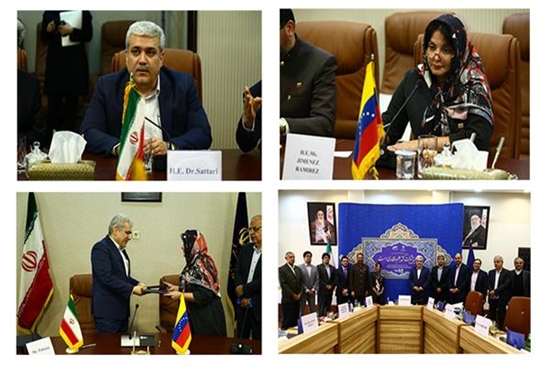By Signing an Agreement;
Scientific and technological cooperation of Iran and Venezuela will be developed
Sorena Sattari, the vice president for science and technology affairs, and Gabriela Servilia Jimenez, the minister of science and technology of Venezuela, talked about the development of scientific and technological cooperation of the two countries and signed a cooperation agreement in this regard.

Sorena Sattari, the vice president for science and technology affairs, and Gabriela Servilia Jimenez, the minister of science and technology of Venezuela, talked about the development of scientific and technological cooperation of the two countries and signed a cooperation agreement in this regard.
During the meeting, Sattari talked about the strategic relationship between Iran and Venezuela, stating: Iran's economy, like Venezuela's, has been dependent on oil sales in the past, but plans to eliminate this type of economy and expanding knowledge-based economy was started in Rouhani’s government. In the past 100 years, dependence on oil has prevented us from using our creative human resources and we forgot that the future of our country relies on these resources and not oil.
No Need for Money to Develop Science and Technology
“Our dependence is what the western governments and the United States want. There is no place for experts in such an environment. Therefore, they leave their country in this situation since the society does not want them.”
The president of the knowledge-based economy and culture-building technologies development headquarter announced the complete preparedness of Iran for implementing the ecosystem in Venezuela, expressing: therefore, this ecosystem does not require money. If that was the case, Dubai would have had made a Silicon Valley. Nonetheless, of the projects in Dubai have become a market for western countries.
In the next part, Sattari mentioned the ecosystem created for pharmacy in Iran, adding: the ecosystem made in this field does not need the help of the government. In fact, there is zero foreign exchange drain in this area. With some maturity, we have the ability to make any kind of medicine in our country and we have will produce drugs two years later when it comes to making medicine inside the country.
The vice president for science and technology affairs talked about the preparedness of Iran for sending medical and lab equipment and drugs to Venezuela, continuing: these knowledge-based products are presented to the market at a very lower cost while they have the same quality as foreign products. In addition, we have proper technologies in the water and health fields, which can be expanded to other countries.
Pointing out the human resources’ capacities of other countries, Sattari marked: with its human resources, Iran has a leading position in the field of science such as nanotechnology, aerospace and biotechnology. In addition, there are currently five thousand knowledge-based companies working to improve the knowledge-based economy, the economic share of whom increase every year.
The vice president for science and technology affairs mentioned that this entrepreneurial generation has been formed in the country and has shaped the bases of economy. In this regard, he continued: therefore, Iran’s future economy will no longer depend on oil. Today, there has been a 15% decrease in this share, and the government has decided to use oil budget only in construction processes.
Science and Technology; Tools to Achieve Freedom
During the meeting, Gabriela Servilia Jimenez, the minister of science and technology of Venezuela, asserted: during my stay in Iran, I visited a pharmacy and became very happy to see the Iranian-made drugs. This shows that they have made progress regardless of sanctions and pressures.
The minister of science and technology of Venezuela continued: on behalf of myself and 30 million people in Venezuela, I thank the government of Iran for dealing with these economic challenges. This is the tool to reach freedom for Venezuela, which is a country that completely depends on oil.
She announced her willingness to cooperate with Iran in three scientific and technological fields, marking: cooperation in areas such as nanotechnology education, biotechnology and engineering, design, technology transfer and other shared services could be areas of good cooperation for both countries. We would also like to send a small group to the Royan Center for training so that this is the seed for our country's future. Moreover, educating our doctors in Iran is a step towards people's well-being.
Signing an Agreement
During the meeting, an agreement entitled “scientific and technological cooperation” was signed between Sattari and Jimenez to take a step toward increasing cooperation between the two countries. This agreement is signed with the goal of promoting and developing cooperation.
Through the agreement, both parties can benefit from exchanging scientists and researchers to exchange experiences and education, hold joint educational courses, hold educational workshops and hold joint exhibitions and booths in the field of innovation and technology.






 adress : No. 209 , between Navab Str and Roudaki Str. Azadi Str. Tehran - Iran
adress : No. 209 , between Navab Str and Roudaki Str. Azadi Str. Tehran - Iran  phone: +98 21 63478000
phone: +98 21 63478000